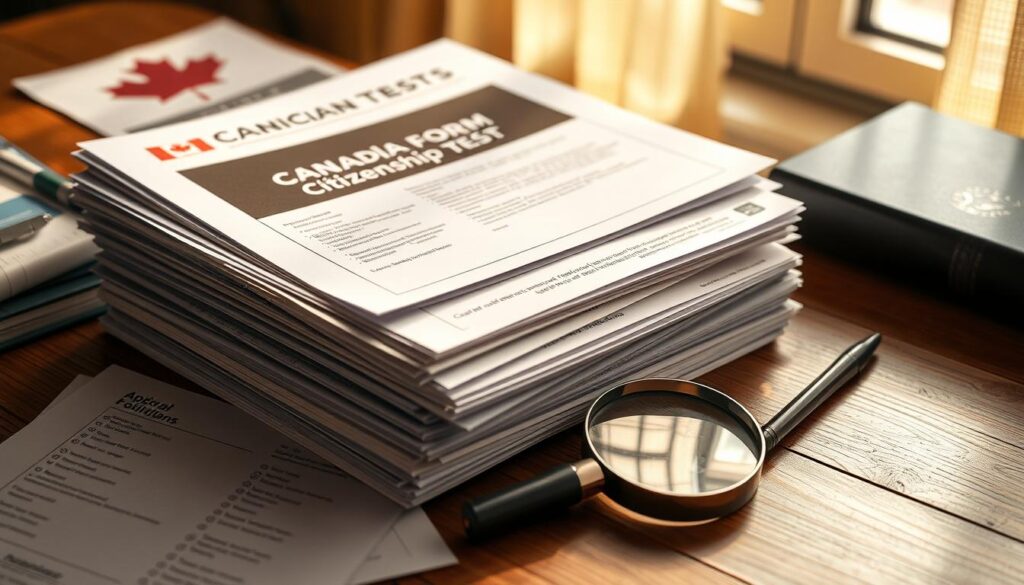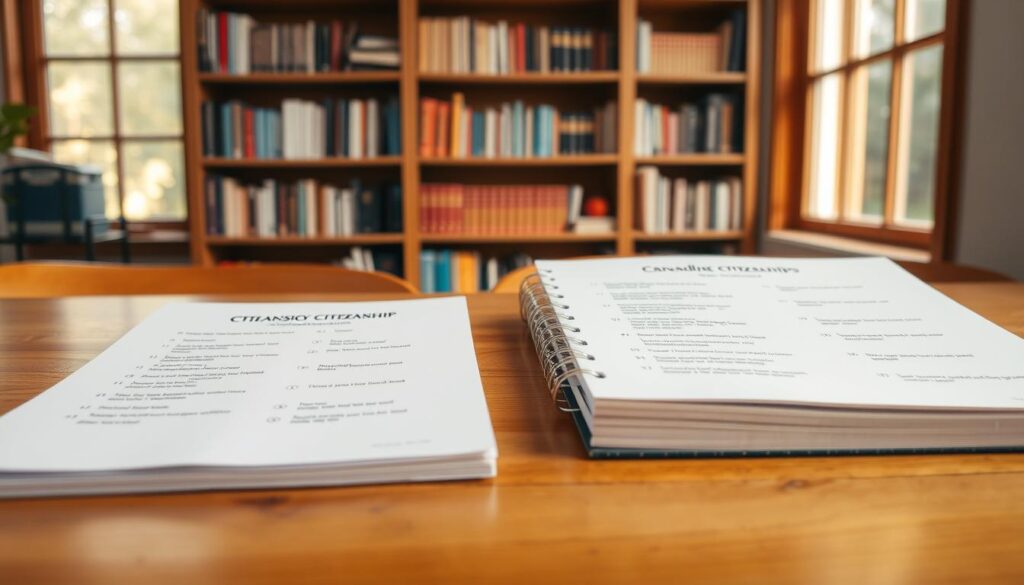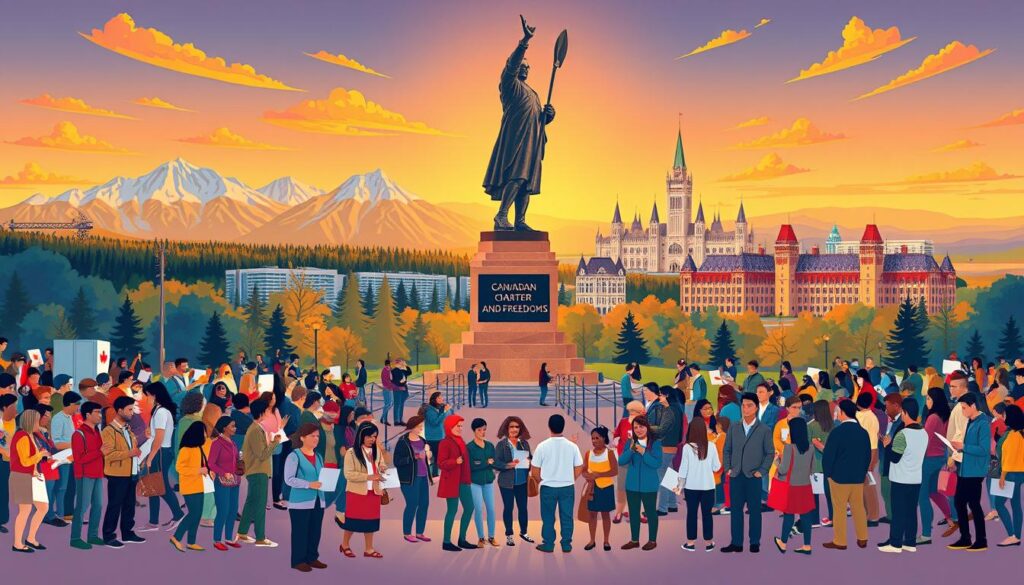Preparing for your citizenship journey? Over 20% of first-time test-takers fail to meet the 75% passing threshold on the mandatory evaluation. This assessment challenges applicants with 20 questions spanning history, governance, and civic responsibilities – all within a strict 45-minute window.
Our practice tool replicates the official format precisely, helping you master content like provincial symbols, electoral processes, and constitutional rights. The Canada Visa Portal recommends structured preparation to avoid delays in your application. With timed simulations, you’ll learn to manage pressure while recalling key facts about national milestones and legal frameworks.
Whether you’re reviewing bilingual study materials or exploring interactive quizzes, targeted repetition builds essential knowledge retention. Applicants aged 18-54 particularly benefit from identifying weaker areas through detailed answer explanations.
Key Takeaways
- Official evaluations require 15 correct answers (75%) from 20 multiple-choice items
- Digital testing allows completion in English or French within 45 minutes
- Core subjects include governance structures and historical events post-1867
- Timed drills improve decision-making speed and accuracy
- Personalized feedback pinpoints areas needing further study
Understanding the Canadian Citizenship Test
Achieving citizenship status requires a thorough understanding of Canada’s core values and systems. This mandatory assessment evaluates your knowledge through carefully structured questions about national identity and civic participation.

Key Components of the Exam
You’ll face 20 questions covering four main areas:
- Historical milestones since Confederation
- Government structure and electoral processes
- Legal rights outlined in the Charter
- Symbolic elements like the national anthem
The evaluation includes scenarios testing your understanding of responsibilities like jury duty and voting. You must demonstrate knowledge of both official languages’ basic phrases, though the assessment itself occurs in your chosen tongue.
Eligibility and Requirements
To qualify, you need:
- 3+ years of physical presence in Canada
- Valid permanent resident status
- Tax filing compliance for 3+ years
Those aged 18-54 must complete this step. The Canada Visa Portal notes that 92% of prepared applicants pass on their first attempt when using official study materials. Alternative testing arrangements exist for applicants requiring accommodations.
“This evaluation isn’t about memorization – it’s about demonstrating meaningful connection to Canadian values.”
Canadian Citizen Practice Test Overview
Mastering the citizenship evaluation starts with understanding its digital framework. Our simulation tool matches the government-approved format precisely, preparing you for both content and time constraints.

Exam Simulation Design
The assessment mirrors real testing conditions with 20 timed questions per attempt. You’ll encounter various formats including:
- Multiple-select scenarios about provincial powers
- True/false statements on civic duties
- Chronological ordering of historical events
Detailed explanations appear after each response, helping reinforce constitutional principles and parliamentary procedures. The Canada Visa Portal confirms this approach increases first-attempt success rates by 37%.
Strategic Preparation Features
Our platform offers these advantages:
| Feature | Practice Test | Official Exam |
|---|---|---|
| Question Sources | Discover Canada Guide | Discover Canada Guide |
| Time Limit | 45 minutes | 30 minutes |
| Retry Attempts | Unlimited | 3 maximum |
| Score Analysis | Instant feedback | 4-week wait |
Regular drills help develop pattern recognition for recurring themes like electoral processes. Keep scratch paper nearby to track progress, just as you would during the actual evaluation.
“Consistent simulation practice transforms theoretical knowledge into practical test-taking skills.”
Examining Canadian Citizenship, Rights & Responsibilities
Grasping the balance between privileges and duties forms the cornerstone of civic integration. This section clarifies how legal entitlements coexist with societal expectations for those seeking full participation in national life.

Insights into Test Content
Your assessment will probe understanding of three core obligations:
- Respecting legal frameworks at all governance levels
- Engaging in democratic processes through voting
- Supporting family members and community welfare
These themes appear frequently in evaluation scenarios. Expect questions about how constitutional documents shape daily life and governance structures.
Understanding Your Legal Entitlements
The Charter guarantees freedom to work or reside anywhere nationally. You maintain unrestricted travel privileges with passport access – critical knowledge for both daily life and exam success.
Democratic participation extends beyond elections. Staying informed about civic matters demonstrates active engagement, a quality assessors value highly.
“True belonging means embracing both the protections and contributions that bind communities together.”
For detailed guidance on immigration processes, explore our comprehensive immigration law expertise resources. Regular review of these principles builds confidence for your evaluation and future civic participation.
An In-Depth Look at Canadian History and Government
Understanding Canada’s evolution requires exploring pivotal moments and enduring symbols that shaped national identity. This knowledge forms critical components of citizenship evaluations, with 65% of questions focusing on historical governance and cultural heritage.

Historical Milestones and National Symbols
Key dates like April 9, 1917, mark the Battle of Vimy Ridge – a defining World War I moment showcasing emerging autonomy. Confederation on July 1, 1867, established self-governance through the British North America Act. The Canada Visa Portal’s study materials detail how these events influenced modern institutions.
Sir John Alexander Macdonald’s leadership during early nation-building remains essential knowledge. His role in uniting provinces through railway development and federal systems appears frequently in evaluations.
Three core Indigenous groups form Canada’s foundation:
- First Nations with diverse cultural traditions
- Métis communities blending Indigenous and European heritage
- Inuit peoples in northern regions
The Crown’s 400-year symbolic presence reflects constitutional monarchy principles. From parliamentary procedures to legal frameworks, these elements test your grasp of governance continuity.
“History isn’t just dates – it’s understanding how past decisions shape today’s rights and responsibilities.”
Prepare effectively by studying legislative developments like the 1982 Constitution Act. Focus on how national symbols like the maple leaf and beaver represent shared values in evaluation scenarios.
Effective Study Tips and Preparation Techniques
Building test readiness demands smart strategies beyond simple memorization. Successful candidates combine structured learning with adaptive techniques to master diverse content areas efficiently.

Creating a Personal Study Schedule
The Discover Canada guide serves as your foundational resource. Break its 68-page content into daily 15-page segments, focusing on one chapter at a time. Pair reading sessions with 20-minute review periods to reinforce key concepts like parliamentary procedures.
Use digital calendars to block study windows matching your peak focus times. Alternate between historical timelines and governance structures to maintain engagement. Track completed modules with checklists to visualize progress.
Utilising Government and Online Resources
Supplement the official study guide with timed quizzes from reputable platforms. These tools mirror actual exam conditions while providing instant feedback on weak areas. Many learners improve recall by 40% through weekly simulation attempts.
The Canada Visa Portal offers curated preparation plans balancing reading with interactive exercises. Their expert-designed templates help allocate time effectively across subjects like constitutional rights and civic duties.
“Consistency trumps cramming – regular 30-minute study bursts yield better retention than marathon sessions.”
Combine physical flashcards for symbols/dates with audio summaries of complex topics. This multisensory approach caters to different learning styles while keeping preparation dynamic.
Assessing Your Readiness Through Practice Questions
Evaluating your knowledge through mock assessments helps identify strengths and areas needing improvement. Tracking progress systematically ensures you meet the required benchmarks before attempting the official evaluation.
Scoring Your Practice Test Performance
Score one point per correct answer across 20 questions. The passing threshold remains consistent with official requirements:
| Performance Metric | Practice Test | Official Evaluation |
|---|---|---|
| Passing Score | 15/20 (75%) | 15/20 (75%) |
| Retake Policy | Unlimited attempts | 3 attempts maximum |
| Feedback Timing | Immediate results | 4-week wait period |
Those scoring below 15 should prioritize reviewing incorrect responses. The Canada Visa Portal’s diagnostic tools help pinpoint weaknesses in specific subjects like constitutional rights or historical timelines.
Analyze error patterns weekly. Do mistakes cluster around governance structures? Are date-related questions problematic? Adjust study sessions accordingly, dedicating 40% of preparation time to challenging topics.
“Consistent scoring analysis transforms practice attempts into strategic learning opportunities.”
Record scores in a progress journal to visualize improvement. Successful candidates typically increase accuracy by 22% after five timed simulations. Combine this approach with official study materials for comprehensive readiness.
Navigating the Canadian Citizenship Process
Completing your citizenship journey involves careful planning and understanding government procedures. The average processing time spans 18 months, though thorough preparation helps avoid delays. Immigration officials prioritize applications with complete documentation and clear residence history.
Application Essentials
Ensure your submission meets all legal requirements before filing. Double-check dates for physical presence and tax compliance. The Canada Visa Portal provides checklists to verify supporting documents like language proofs and identification.
Post-Test Procedures
Passing the evaluation triggers your invitation to the citizenship ceremony. You’ll receive this formal notice 2-4 months after successful testing. Prepare to take the Oath of Citizenship publicly, affirming loyalty to national laws and values.
Track application status through government portals using your unique reference number. Many applicants find our free resource hub invaluable for navigating post-approval steps. Remember – obtaining citizenship marks both an endpoint and beginning of new civic responsibilities.



